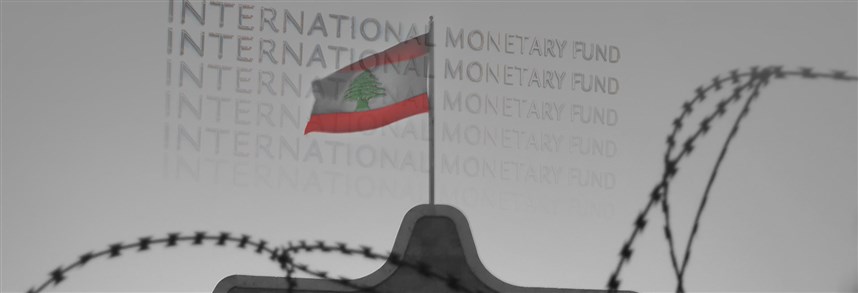The Shadow Plan: How Lebanese elites are sabotaging their country’s IMF lifeline

Executive Summary
Lebanon’s economy is in shambles. The national currency, the lira, has lost almost 99 percent of its value against the U.S. dollar. More than half of Lebanese are now living in poverty.1 The country’s banks are insolvent and nonfunctional. The World Bank has called the country’s collapse one of the worst economic crises in modern history.2
Few countries in recent memory have been in such desperate need of an International Monetary Fund (IMF) program. And the IMF is ready to help, as long as Lebanon commits to basic reforms that would help restore its macroeconomic stability.
Yet Lebanon is on track to get nothing, because ruling elites have effectively sabotaged the IMF negotiating process. What’s more, they have misled the Lebanese public about the reality of the country’s dire situation. The country’s leaders are instead executing a non-IMF “shadow plan” that will crush and immiserate most Lebanese.
Lebanon’s ruling class prospered in the country’s old rentier economic order, and that class has fiercely resisted attempts to reform. The country’s first negotiations for an IMF deal, in 2020, were defeated by a revolt of political and financial elites. In April 2022, a new Lebanese government signed a preliminary “staff-level agreement” with the IMF. But in order to reach a full agreement on an IMF program, Lebanon still needs to implement roughly ten structural reforms. More than a year later, it has achieved almost none.
There are two main reasons why Lebanon’s IMF talks have stalled, both related to Lebanese elites’ basic antipathy to reform. The first is that the IMF is negotiating with an official Lebanese team that does not represent the country’s political class. That broader political class is not invested in the official Lebanese team’s recovery plan or motivated to carry out reforms agreed with the IMF—in fact, it has conspired against them.
The second reason is a political discourse filled with bad-faith anti-IMF narratives and general misinformation. Powerful interest groups—including Lebanon’s politically influential banks—have saturated the country’s political media with falsehoods, among them that the government’s recovery plan would somehow erase ordinary bank depositors’ savings. The Lebanese public has gotten very limited straight information on where the country’s IMF talks really stand.
This joint report by The Policy Initiative and Century International explains why Lebanon’s IMF talks have been so troubled, and what might save them. It is based on interviews with more than two dozen current and former Lebanese officials; politicians; civil society leaders and experts; and representatives of donor countries and international institutions. Many were interviewed on condition of anonymity, in order to speak freely. It builds on past research by The Policy Initiative and Century International on Lebanon’s politics and political economy.
There are still things that key players inside and outside Lebanon can do to bring the country closer to an IMF deal. Hope is not entirely lost. The IMF can improve its public communication about Lebanon’s lack of progress toward an IMF program and keep up its more recent direct engagement with lawmakers. Donor countries, for their part, should support ongoing criminal investigations into Lebanese elites; those countries should also design assistance to preserve the remaining capacity of Lebanon’s state institutions. They also ought to insist that the government properly resource Lebanon’s negotiating team. And Lebanon’s civil society and reformist elements in government should keep working to inform the public about Lebanon’s IMF talks, and what’s really at stake.
Ordinary Lebanese people have mostly been kept in the dark about elite dealings with the IMF—and it is these ordinary Lebanese who have suffered extraordinary privations as a result of the irresponsible choices of their elites. They deserve to know the truth about Lebanon’s IMF’s talks and about what’s next for Lebanon, so they can reclaim some agency and help decide the country’s economic future. There is still a chance that public pressure could convince Lebanon’s leaders to act responsibly and salvage an IMF deal that would rescue the country’s economy. But failing that, Lebanese people should at least know how their elites have failed them, so they can try to hold those elites accountable.
1. “Food Security and Vulnerability Analysis of Lebanese Residents,” World Food Programme, July 2022, 3, 11, https://reliefweb.int/report/lebanon/wfp-lebanon-food-security-and-vulnerability-analysis-lebanese-residents-july-2022.
2. “Lebanon Economic Monitor, Spring 2021: Lebanon Sinking (to the Top 3),” World Bank, June 1, 2021, https://www.worldbank.org/en/news/press-release/2021/05/01/lebanon-sinking-into-one-of-the-most-severe-global-crises-episodes.
From the same author
view allMore periodicals
view all-
06.14.24
عطاالله: التدّخل السياسي عقبة أمام تطوّر الإدارة العامة
سامي عطا اللهمقابلة مع مدير مبادرة سياسات الغد الدكتور سامي عطاالله أكد أن "التدخل السياسي هو العقبة الرئيسية أمام تطور الإدارة العامة"، وشدد على أن دور الدولة ووجودها ضروريان جدًا لأن لا وجود للاقتصاد الحر أو اقتصاد السوق من دونها"
اقرأ -
10.27.23eng
تضامناً مع العدالة وحق تقرير المصير للشعب الفلسطيني
-
09.21.23
مشروع موازنة 2023: ضرائب تصيب الفقراء وتعفي الاثرياء
وسيم مكتبي, جورجيا داغر, سامي زغيب, سامي عطا الله -
09.09.23
بيان بشأن المادة 26 من مشروع قانون الموازنة العامة :2023
-
08.24.23
من أجل تحقيق موحد ومركزي في ملف التدقيق الجنائي
اقرأ -
07.27.23
المشكلة وقعت في التعثّر غير المنظّم تعليق دفع سندات اليوروبوندز كان صائباً 100%
-
05.17.23
حشيشة" ماكينزي للنهوض باقتصاد لبنان
-
01.12.23
وينن؟ أين اختفت شعارات المصارف؟
-
10.12.22eng
فساد في موازنة لبنان
سامي عطا الله, سامي زغيب -
06.08.22eng
تطويق الأراضي في أعقاب أزمات لبنان المتعددة
منى خشن -
05.11.22eng
هل للانتخابات في لبنان أهمية؟
كريستيانا باريرا -
05.06.22eng
الانتخابات النيابية: المنافسة تحجب المصالح المشتركة


